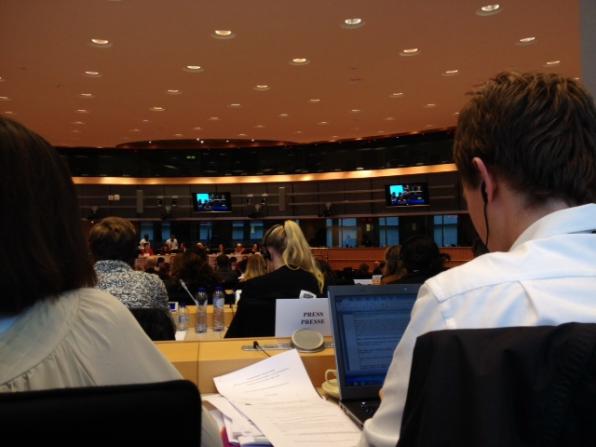It was not the most groundbreaking of conferences nor did it feature many breakthroughs in the discussion about women’s position in (and stance towards) the EU, but it did raise some interesting questions, not only over issues affecting women, but also regarding Greece’s position in (and stance towards) the EU in general.
The European Parliament (EP) seminar for journalists about May’s European Elections was held in Brussels on March 4th and 5th and focused on two main themes: the campaign “Preventing Violence Against Women,” and women’s perception of, and projected interest, in the upcoming elections.
Women as victims of violence
The report by the European Union Agency for Fundamental Rights (FRA), which was presented at the relevant Interparliamentary Committee Meeting, presented results from the world’s biggest-ever survey on violence against women, revealing the extent of abuse suffered by women at home, work, in public and online.
With 25% of Greek women having experienced physical and/or sexual violence since the age of 15 (the European average is 33%), Greece finds itself in the position of being the 9th least violent country in the EU. However this relatively good score is seriously compromised by the fact that these women have no idea about who to turn to: only 26% of those asked could name two organisations that aim to help female victims of violence.
According to the rest of the findings:
- 33% of Greek women (EU average 43%) have experienced some form of psychological violence by either a current or a previous partner.
- 25% (EU average 33%) have childhood experiences of physical or sexual violence at the hands of an adult.
- 43% (EU average 55%) have experienced some form of sexual harassment.
On the basis of these findings, the FRA advises, among other things, that EU Member States should ratify the Council of Europe’s Convention on preventing and combating violence against women and domestic violence. This is known as the Istanbul Convention and has, to date, been ratified only by Austria, Italy and Portugal.
Speaking about the general issue Marina Yannakoudakis, a UK MEP, commented that legislation for combating violence against women is all well and good, but we need to get back to the basics by promoting media awareness and working closer with victims.
At the same time, violence against women was voted in the EP’s Eurobarometer survey as the most important issue of gender inequality that has to be dealt with by the EU.
Women as voters
The Eurobarometer also resulted in some interesting findings regarding the stances of Greek women and men as voters within the EU.
Women, it seems, are significantly less interested in European policy issues than men (39% vs 52%). Yet overall Greek voters seem slightly more involved (48%), compared with the EU average (37%). Women in Greece are also less assured than men that Greece’s membership of the EU is an unquestionably good thing (30% vs 39%).
These findings are aligned with the reasons given by EU voters, both men and women, for not voting in the previous European Elections of 2009: namely their lack of trust in politics and their lack of knowledge about the European Elections.
Why are these elections different, especially for Greece?
According to Jaume Duch Guillot, spokesman for the EP, the economic crisis has got more Europeans interested in Europe as now most of the economic and social decisions affecting citizens’ everyday lives are being taken in Europe and by individual member states (as a result of the Lisbon Treaty and the subsequent change in the competencies and powers of the EP – the new EP is to now elect the president of the European Commission). And because women have
systematically emphasized their interest in areas directly affecting day-to-day life (economic growth, unemployment, the future of pensions, public health etc) as reasons to actually vote in the elections, the EU has obviously turned their “re-branding the European Parliament” efforts towards them.
Women as politicians
At the same time, the member countries’ recent experience of researching and proposing suitable female candidates for the EP elections has been the main axis for an in-depth discussion about the participation of women in the decision making centers of politics, business and public administration within the EU.

Women MEPs participating in the related panel discussion stated that, through the selection process, it became clear that – at least in a number of member states – women don’t want to be involved in politics. For that to change, they suggested, we need to change the nature of politics itself in order to ensure that combining a career in politics with personal and/or family life becomes a viable option for all women who wish to do so.
Antonyia Parvanova, a member of the Committee on Women’s Rights and Gender Equality, observed that how women get involved in European politics is a result of how they become involved in national politics – and Greece finds itself in 7th-from-last position with regards to the percentage of women representatives in the EP.
Most of the female MEPs that participated in the discussion spoke in favour of female representation quotas, both in business and in politics. But as an answer to the question of what would make women become more actively involved in politics, the consensus seemed to be that there’s a need for women to realize that everything that happens within the EU and its institutions has an enormous impact on their everyday lives.
//www.youtube.com/embed/QG1sgqDBQrk